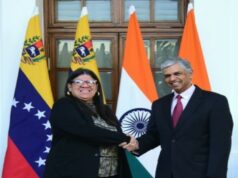
The U.S. Treasury has sanctioned two Indian nationals and an online pharmacy for supplying counterfeit fentanyl-laced pills that fuelled America’s opioid crisis.
The U.S. Department of the Treasury’s Office of Foreign Assets Control (OFAC) on September 24 announced sanctions on Sadiq Abbas Habib Sayyed, born December 8, 1985, and Khizar Mohammad Iqbal Shaikh, born July 7, 1991, both Indian citizens, along with Shaikh’s company KS International Traders, also known as KS Pharmacy. OFAC accused them of working with Dominican Republic- and U.S.-based narcotics traffickers to distribute counterfeit pills laced with fentanyl, fentanyl analogues, and methamphetamine.
“Too many families have been torn apart by fentanyl. Today, we are acting to hold accountable those who profit from this poison,” said Under Secretary for Terrorism and Financial Intelligence John K. Hurley, adding that the Treasury will continue to advance President Trump’s commitment to Make America Fentanyl Free by targeting traffickers.
The Treasury highlighted the growing role of illegal online pharmacies, including those based in India, in fuelling the fentanyl crisis. Such operations lure buyers by posing as legitimate sellers of brand-name or generic medications but instead deliver counterfeit products laced with dangerous synthetic drugs. The problem is global: Mexican cartels source precursor chemicals from Indian suppliers and Chinese manufacturers for use in clandestine laboratories before pushing the drugs into the United States.
Sayyed and Shaikh marketed their products as discounted pharmaceuticals but instead sold counterfeit pills made with fentanyl, methamphetamine, and related substances. Both men used encrypted messaging platforms to coordinate orders, advertise supplies, and reassure buyers of the supposed authenticity of their products. Sayyed often concealed his identity with aliases such as Jonathan Acosta and Rakesh Sharma, while Shaikh operated openly through KS International Traders, portraying it as a legitimate pharmacy even as it continued functioning after he faced federal indictment.
The U.S. Drug Enforcement Administration had already warned in October 2024 about the surge of illegal online pharmacies selling counterfeit Oxycodone, Adderall, Xanax, and other drugs laced with fentanyl and methamphetamine to unsuspecting American customers. Screenshots of KS International Traders’ website months after the Department of Justice unsealed its 2024 indictment against Shaikh showed the company still advertising a wide range of pharmaceutical products.
Despite being indicted in September 2024 by a federal grand jury in the Southern District of New York on narcotics-related charges, Sayyed and Shaikh kept operating their network. They relied on digital payment systems, encrypted chats, and international shipping routes designed to disguise the true origin and contents of their packages. These methods enabled them to push hundreds of thousands of counterfeit pills into the United States.
The focus on individual traffickers is mirrored by broader enforcement against Indian chemical companies supplying the raw materials for fentanyl. In January 2025, the Department of Justice indicted two Gujarat-based firms, Athos Chemicals and Raxuter Chemicals, for allegedly importing fentanyl ingredients into the United States and Mexico.
Both companies were charged with distributing the chemicals and conspiring to distribute them, while Raxuter and senior executive Bhavesh Lathiya, 36, faced additional charges of smuggling and introducing misbranded drugs into interstate commerce. These cases underscore that the fentanyl problem is not limited to finished pills or online pharmacies, but stretches all the way to the chemical supply chain in India, connecting directly to Mexico-based cartels and the U.S. opioid epidemic.
The sanctions against the Indian traffickers and chemical companies are part of a wider U.S. strategy to disrupt global synthetic opioid supply chains—a fight that increasingly overlaps with geopolitics. Earlier this year, the White House doubled tariffs on certain imports from China, citing Beijing’s failure to stop the export of chemicals used in fentanyl production. Washington framed the move as not just a trade measure but a matter of national security, highlighting how the opioid crisis is tied to global supply chains that involve China, India, and Mexico.
In this context, targeting Sayyed and Shaikh, alongside actions against Indian chemical companies, demonstrates that Washington is now going after the entire network of suppliers and traffickers. The fentanyl crisis is being treated less as a domestic law-and-order issue and more as a transnational challenge that intersects with U.S. foreign policy, trade policy, and public health strategy.
OFAC said both men were sanctioned under Executive Order 14059 for contributing to the spread of illicit drugs, while KS International Traders was blacklisted for being owned and controlled by Shaikh and used in his trafficking business.
As a result, all property and assets of the sanctioned individuals and the company in the United States are frozen, and U.S. persons are banned from doing business with them. Any company owned 50 per cent or more by the sanctioned parties is also automatically blocked. Those who violate the sanctions could face civil or criminal penalties, and financial institutions worldwide risk penalties if they deal with designated persons.
OFAC stressed that its sanctions are not only meant to punish but also to encourage changes in behaviour, noting that people and entities can apply to be removed from the sanctions list if they meet the requirements.
On the same day, OFAC issued a final rule amending the Syria-Related Sanctions Regulations, renaming them the Promoting Accountability for Assad and Regional Stabilization Sanctions Regulations, and incorporating provisions from Executive Orders 14142 and 14312. The changes will take effect when published in the Federal Register on September 25.
OFAC also updated its Specially Designated Nationals and Blocked Persons List to include Sayyed, who used aliases such as Jonathan Acosta and Rakesh Sharma, and Shaikh, both listed with their personal details, as well as KS International Traders, based in Mumbai, Maharashtra, with its tax ID and website identified.
The designations were coordinated with the Department of Justice, Drug Enforcement Administration, Homeland Security Investigations, Internal Revenue Service–Criminal Investigations, and the U.S. Postal Inspection Service. Together with parallel measures on Syria and regional stabilisation, the sanctions reflect Washington’s broader strategy of targeting both individuals and state-linked networks involved in the international fentanyl trade.
In a career spanning three decades and counting, Ramananda (Ram to his friends) has been the foreign editor of The Telegraph, Outlook Magazine and the New Indian Express. He helped set up rediff.com’s editorial operations in San Jose and New York, helmed sify.com, and was the founder editor of India.com.
His work has featured in national and international publications like the Al Jazeera Centre for Studies, Global Times and Ashahi Shimbun. But his one constant over all these years, he says, has been the attempt to understand rising India’s place in the world.
He can rustle up a mean salad, his oil-less pepper chicken is to die for, and all it takes is some beer and rhythm and blues to rock his soul.
Talk to him about foreign and strategic affairs, media, South Asia, China, and of course India.




